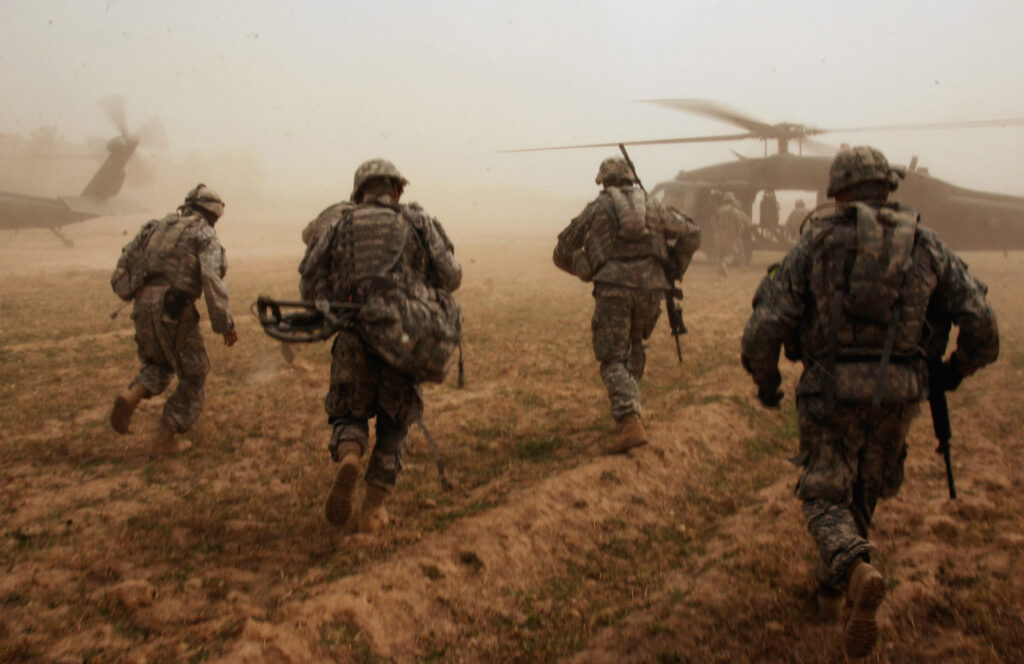The killing of General Soleimani in Iraq on January 3rd and Iran’s launching of missiles against a US military base a few days later forced the Democratic candidates to make statements about this unexpected and sensitive subject. In the final stretch before the first caucus in Iowa on February 3rd, foreign policy has made its way to the centerstage.

By ordering the assassination of Qassem Soleimani at the beginning of January a few days after the US embassy attack in Baghdad, Donald Trump not only ended relations with Iran but also, indirectly, created trouble in the Democratic primaries.
Soleimani was the head of Iran’s elite Quds military force, one of the most powerful figures in the Islamic Republic. He was killed in an airstrike ordered by Trump in Iraq. The president said that the action was taken « to stop a war, » not start one. But the attack was seen as a declaration of war. In response, Iran fired a number of missiles at two Iraqi bases housing US troops on January 7th. One month before the first caucus in Iowa, it put the subject at the heart of the Democratic primaries.
The Democrats are used to debating themes like healthcare or wealth taxes than about foreign policy. The escalation of violence forced them to react and chose a “yes, but” position: they couldn’t agree with any declaration of war nor could they denounce the killing of this man who is seen as a public enemy. This is arguably the first they are being tested on their ability to their respond to a major international crises.
Sanders vs Biden : two favorites, two positions
He is leading the field in the polls for the Democrats (27.6%): Joe Biden is seen as a serious opponent for Donald Trump. The Iran move was the occasion to emphasize his foreign policy experience: he had a long mandate as chair of the Senate foreign relations committee and spent eight years as vice-president of Barack Obama.
“[Soleimani] supported terror and sowed chaos. None of that negates the fact that this is a hugely escalatory move in an already dangerous region,” said Biden in a statement after the strike, on Thursday, January 2nd. “I hope the Administration has thought through the second and third-order consequences of the path they have chosen. But I fear this Administration has not demonstrated at any turn the discipline or long-term vision necessary”, he added. A few days after, when Iran struck US bases on Tuesday, January 7th, he declared : “What’s happening in Iraq and Iran today was predictable”.
Second in the polls (18 %), the non-interventionist Bernie Sanders didn’t wait either to react. In total contrast with his rival. He said on Twitter: “When I voted against the war in Iraq in 2002, I feared it would lead to greater destabilization of the region. That fear unfortunately turned out to be true. Trump’s dangerous escalation brings us closer to another disastrous war in the Middle East”. Bernie Sanders is the second presidential candidate to have voted in Congress against intervention in the Iraq war in 2002. By mentioning that, even if he doesn’t make a direct reference to his rival Biden, Sanders is drawing a comparison with his opponent. A few days later, on Monday, January 6th on CNN, he clearly pointed out the fact that Joe Biden “helped lead the effort for the war in Iraq”.
The two older candidates, 78 and 77, turn that data into an advantage to underline their experience. Biden wants to appear as a commander in chief, asking: “Do Donald Trump and his administration have a strategy for what comes next ?”. Sanders wants to represent the wise war opponent who was opposed to the Vietnam War when he was young, and warned about the danger of invasion in Iraq.
A new law to reinforce Congress ?
A day after Trump approved an airstrike against Qasem Soleimani, Senator Bernie Sanders and the Representative Ro Khanna proposed a law to block Pentagon funding for “any unilateral actions this president takes to wage war against Iran without congressional authorization. The Republicans are a majority in the Senate so it is unlikely that the law passes. Furthermore, the House voted on Thursday a war powers resolution – which does not carry the force of law – to limit President Donald Trump’s military action.
Debate on words
Between these two contenders, there is a candidate who is trying to give her campaign a second wind (15.3% in the polls), without great success. Elizabeth Warren’s position is nuanced, but is also changing as the days go by. On Tuesday, January 7th, she gave a sober statement about the Iranian missiles : “This is a reminder of why we need to de-escalate tension in the Middle East. The American people do not want a war with Iran”.
Just after the strike, she called Soleimani a “murderer, responsible for the deaths of thousands, including hundreds of Americans”. The liberal left that she is trying to reach didn’t like that statement. On Sunday, she referred to Soleimani as only « a government official, a high-ranking military official”. Her rhetoric started to change on Friday: “Now [Donald Trump] has assassinated a senior foreign military official. He’s been marching toward war with Iran since his first days in office”, she wrote on Twitter.
The word assassination was also used by Sanders which didn’t please the former New York Mayor Michael Bloomberg. He said it was « outrageous » for the Vermont senator to call the strike an « assassination ». « This is a guy who had an awful amount of American blood on his hands ».
Pete Buttigieg, a retired military intelligence officer, has been more discrete. Even if he has less political experience than the others, he chose to weigh in on the debate, having been on the ground in the Afghanistan war. In his statements, he questioned the president’s responsibility and strategy: “there are serious questions about how this decision was made and whether we are prepared for the consequences”. He also said that the US would need “a forward-looking view from the next president.
A poll published on The Huffpost on January 6th about the Soleimani strike showed that 62% of Democratic voters said they “trust” Joe Biden on Iran. For Sanders and Warren, it is 47%. Is this a sign that Democratic voters want a “commander in chief” rather than a “anti-war” figure? In the next few days, this subject could invade the primaries and divide the Democrats as the escalation in the Middle East continues.
Hippolyte Radisson
